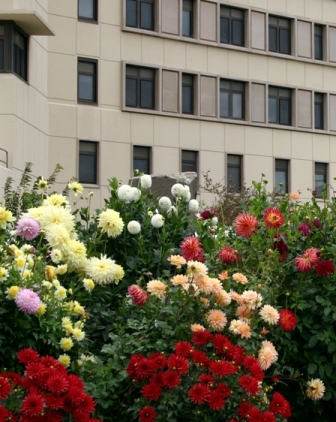
Spokane Volunteers Thank Vets with Dahlias
This spring, for the twelfth year in a row, our good customer Claudia Biggs is planting over 200 dahlias in front of the VA Medical Center in Spokane, Washington. It’s a lot of work, but she won’t be alone. Every year her husband Dennis and a dozen friends from the Inland Empire Dahlia Society help plant and tend the dahlias. And they’re happy to do it. “The vets love the garden,” Claudia says, and there’s nothing better than “seeing the enjoyment on their faces.”

austere architecture
The garden fills an area that’s roughly 20’ x 30’ next to the hospital’s front entrance. It’s ringed by a wheelchair-friendly sidewalk, and within it the eleven rows of dahlias — each with up to 21 plants in it — are arranged so people can walk among them and enjoy the flowers up close. In the center, dwarf dahlias surround a complex of rough-hewn stones, a memorial to an ex-POW who loved flowers.
Dahlias of every color and form, old and new, fill the garden, and Claudia adds different ones every year. When we offered to donate some heirlooms this spring, she happily agreed, choosing D. atropurpurea, ‘Andries Orange’, ‘Clair de Lune’, ‘Deuil du Roi Albert’, ‘Hockley Maroon’, ‘Jersey’s Beauty’, ‘Mrs. H. Brown’, ‘Mrs. Le Boutillier’, and ‘Stolz von Berlin’.

As they work in the garden, Claudia and her crew answer visitors’ questions — including “What kind of tomatoes are those?” — and a nearby literature-holder offers free dahlia-growing guides. The goal, Claudia says, is to “encourage patients, staff, and visitors to not only enjoy the garden, but to learn how to plant dahlias for themselves.”
In the fall, the tubers are dug and stored. Any that aren’t needed for the next year’s garden are sold at the society’s popular spring sales, with all proceeds going to promote gardening in Spokane.
Claudia and her husband worked at the hospital for thirty-plus years, and “now this is our contribution to the veterans,” she says. “We surely enjoy seeing them come out to the garden, alone or with their families. It often seems to be the bright spot of their day.”












